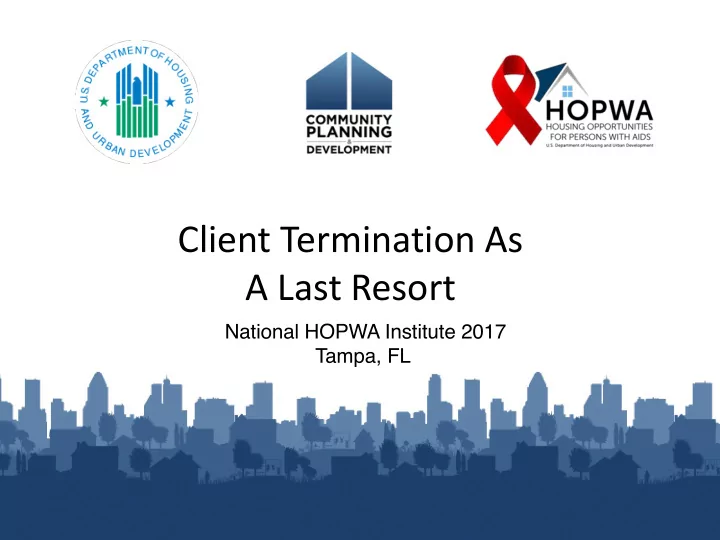

Client Termination As A Last Resort National HOPWA Institute 2017 Tampa, FL
Learning Objectives q Understand what constitutes cause for client termination, per the HOPWA regulations. q Know what due process is guaranteed to the client in the event of a termination. q Understand that client termination is a last resort and is reserved for special circumstances, as outlined in the regulations. 24 CFR part 574
The HOPWA Institute: “Housing’s Role in Ending the HIV Epidemic”
Regulations HOPWA regulations require a formal process for handling the termination of HOPWA clients. Termination procedures should address termination due to one of the following: 1. Death of the client 2. Criminal activity directly relating to domestic violence, dating violence, sexual assault, or stalking 3. Violation of regulations/program requirements/ conditions of occupancy 4. Absence from Unit Policy 24 CFR part 574
Client Termination 1. Violation of regulations/program requirements • Grantee must have a formal written process which follows due process law • Process must include written notice, clear statement of reasons for termination, allowance for review/ rebuttal by client, & prompt written notice of final decision 2. Termination/Eviction Procedures: • Specific behaviors or circumstances that will cause termination • Rules must include due process for terminated clients 5
Client Termination 1. Death of the client • Surviving family may continue to receive housing &/or supportive services for a grace period • Grantee establishes the grace period EMSA-wide • Grace period cannot exceed one year 2. Client termination or eviction due to domestic violence, dating violence, sexual assault or stalking • Remaining family may continue to receive housing &/or supportive services for a grace period • Grace period no less than 90 days and not more than one year
Client Termination Termination/Eviction Procedures: • Explanation of service grace period provided for – Surviving family members – Remaining family members following bifurcation of a lease or eviction as a result of domestic violence, dating violence, sexual assault, or stalking
Client Termination ü Procedures should be known to clients and staff – be transparent ü Make sure clients know: • Your program rules • Their due process rights ü Be sure your rules are as fair as possible and applied equally to all participants ü Know local landlord/tenant laws ü Know Fair Housing rules! 8
The TBRA Time Limit Myth! HUD views TBRA as a permanent housing activity! Ø Similar to Section 8/HCV Ø Ongoing legal right to live in a unit Programs should not discharge HOPWA households into an unstable situation or homelessness
Eviction Prevention 10 What are the case manager responsibilities? ü Helping client understand rights and responsibilities in relation to eviction ü Provide clients with possible housing options to keep clients from re-entering into homelessness ü Advocating for tenants with landlords for fair treatment during eviction process.
Eviction Prevention Activities of Daily Living (ADLs)! ü Educate the tenant on the conditions of the lease. ü Talk about how to be a good neighbor. ü Provide guidance on handling maintenance issues. ü Make regular home visits. ü Explain the consequences of lease violations and eviction. ü 11
Eviction Prevention- Policies ü Remind tenants about the risks of behaviors that may threaten their housing stability ü Record reminders in a daily log ü Issue a verbal warning when a violation occurs
Eviction Prevention-Policies • Warning should be put in writing when: Ø Violations are serious Ø Tenant continues to violate lease terms • Document Verbal warnings and written warnings
Behavior Contracts Behavior contracts as a condition for housing/housing subsidy are used when: Ø Loss of housing/housing subsidy is tied to events/ behaviors with a housing-related consequence Ø Lease violations based on pattern of behavior Ø The behavior can be reasonably expected to change Ø Tenant engages in offered and agreed to services
QUESTIONS? ü What should our rules say? Are they clear and fair? ü How can we enforce the rules and not discharge clients into homelessness? ü Do our termination policies differ between rental activities: TBRA vs Master Leasing vs Facility-Based Housing? ü What is our bottom line? ü What has worked?
Recommend
More recommend